Brazil 'surfing war photographer' Eduardo Martins exposed as fake
- Published

The fake photographer photoshopped a British surfer into images of Middle East conflict
Eduardo Martins' story was too perfect even for the world of internet celebrity.
The 32-year-old from Brazil said he had been abused as a child and beat leukaemia as a young adult.
But he had turned his life around and now worked as a UN photographer whose experiences helped him connect with human suffering in some of the world's most dangerous conflict zones.
His work appeared in reputable international outlets such as Getty Images, The Wall Street Journal, Vice and BBC Brasil.
In between trips to Mosul in Iraq, the Syrian city of Raqqa under the control of so-called Islamic State (IS) and the Gaza Strip, Eduardo Martins enjoyed surfing.
He shared glimpses of his life with his almost 125,000 Instagram followers.
Until it all came crumbling down when a BBC Brasil investigation found out that Eduardo Martins was a completely fictitious character.
Inverted images
For years, someone using that name had been stealing pictures taken by professional photographers who had risked their lives in conflict to get them.
Eduardo Martins fooled journalists and picture editors by making slight alterations to the images, such as inverting them, just enough to elude software that scans pictures for plagiarism.
A number of them were stolen from US photographer, Daniel C. Britt.

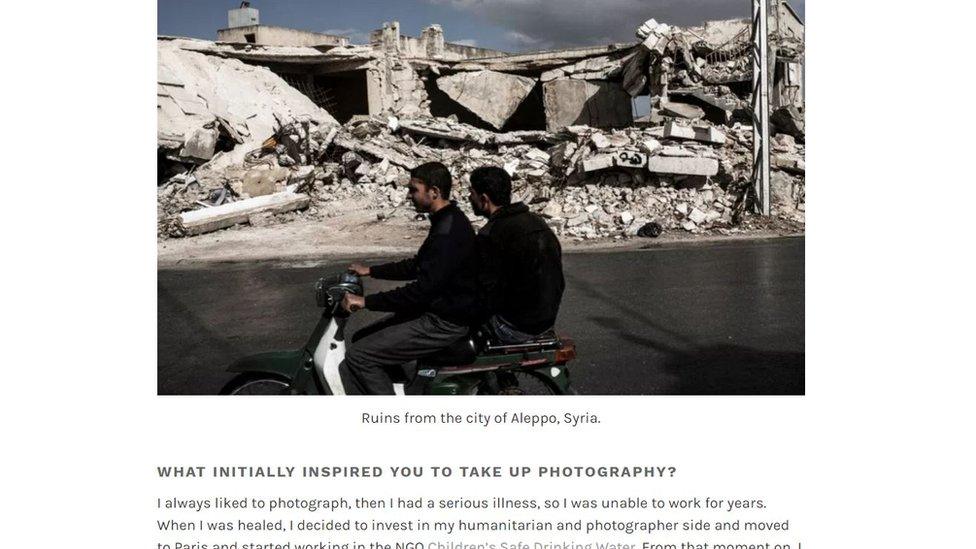
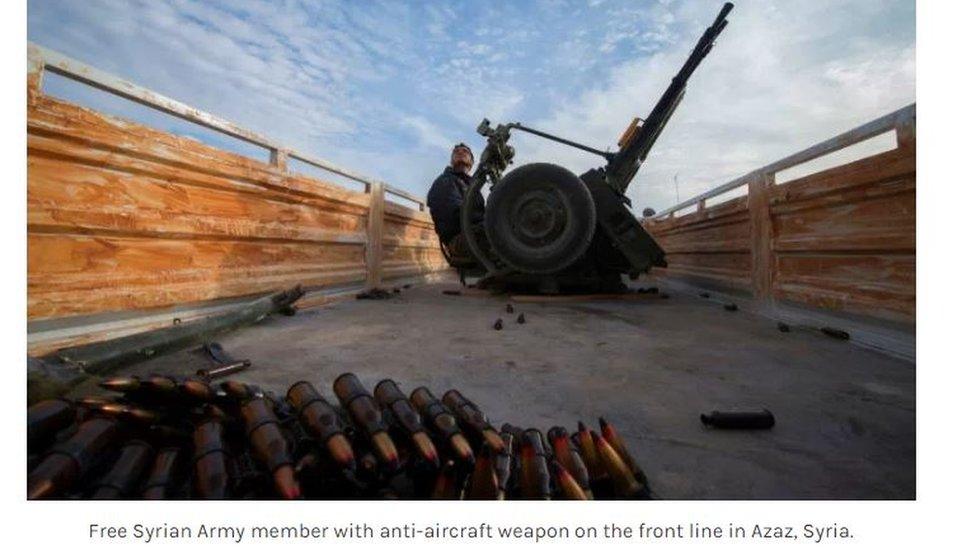
Daniel C. Britt's images were inverted and sold to newspapers such as the Wall St Journal, magazines such as Recount Magazine and agencies such as Zuma and Getty Images
As Eduardo Martins' list of clients grew and became more impressive, it became easier for him to distribute the next lot of photos. He further boosted his profile by giving interviews to websites and magazines.
"Once in Iraq shooting a conflict, I stopped shooting to help a boy who was hit by a molotov cocktail, dropped the camera and helped get him out of the conflict area," he told, external Recount Magazine in October 2016.
"In scenes like this, which are common in my work, I stop being a photographer and become a human being. I cannot be impartial in these moments."
Fabricated identity
He kept his cover going by stealing images of Max Hepworth-Povey, a British surfer, and photoshopping him into pictures of war zones.
Mr Hepworth-Povey remained completely unaware of the fraud until it was exposed.
"When a friend showed me the pictures, at first I thought it was a joke, someone making fun of me," he told BBC Brasil.
"But actually my pictures had been stolen. It is mad that a random guy has decided to use my image amidst so many options on the internet."
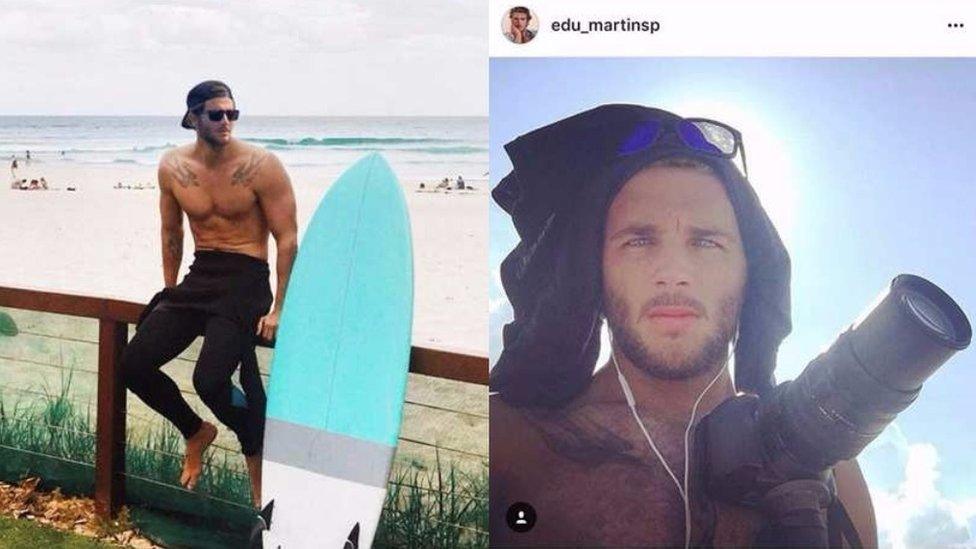
Max Hepworth-Povey was unaware his identity had been stolen
The 32-year old from Cornwall said some of the images stolen from him date back five years.
"I work very far from war zones, with surfing trips," said Mr Hepworth-Povey, who has been living and working in northern Spain for the past three months.
"I don't like the idea of creating an aura of glamour around a country in conflict."
Fraudster busted
Eduardo Martins' career came to an end after he contacted Natasha Ribeiro, a BBC Brasil contributor based in the Middle East.
She became suspicious because neither she nor any others among the small pool of Brazilian journalists working in the region had ever met an Eduardo Martins in person.
So BBC Brasil reporters started digging.
They got in touch with the UN, which confirmed he was not employed by them.
Organisations that the fraudster claimed to have visited around the world were also contacted and none of them recognised him.
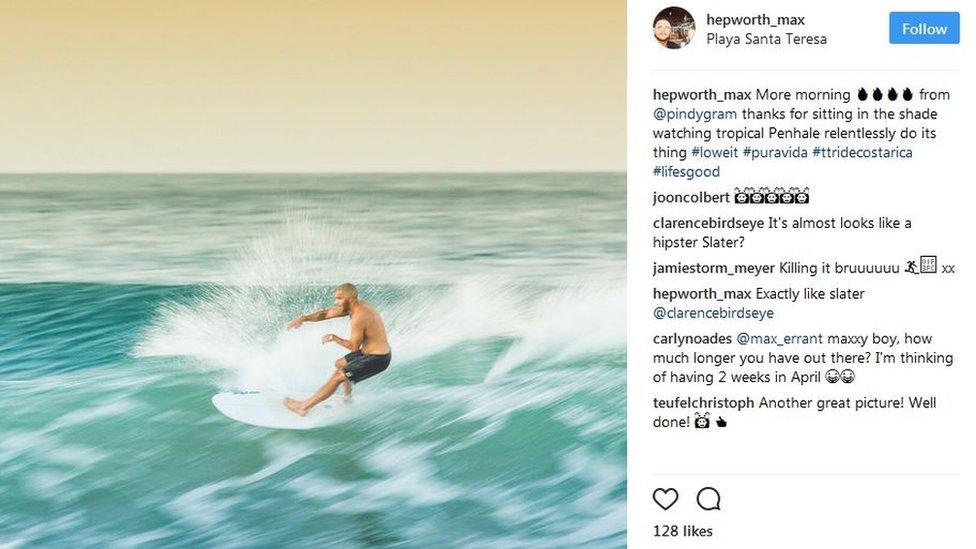
Max Hepworth-Povey's surfing pictures were also used to build Eduardo martins' identity
Mr Hepworth-Povey told BBC Brasil that back in 2014 he had been contacted by someone identifying himself as "Bruno" who wanted to talk to him about some work related to surfing.
But when the pair tried to have an online meeting, "his video wasn't working and eventually I said I was no longer interested", Mr Hepworth-Povey recalls.
The surfer says that a week later, a fake profile of his appeared on Facebook, which led Mr Hepworth-Povey to close his Facebook account. "It was all very creepy," he said.
The timing coincides with the period that Eduardo Martins started sending pictures to publications around the world.
It could also explain why editors contacting Eduardo Martins via Skype would see a picture of the handsome surfer before the connection allegedly dropped and the conversation with the fake photographer moved to voice and text messages sent via messaging service WhatsApp.
Online romances
BBC Brasil has also been in contact with one of at least six women, all young and professionally successful, who say they had romantic online relationships with Eduardo Martins.
None of them has ever met him in person and they all have asked to remain unidentified.
Once it was clear Eduardo Martins was a fake, BBC Brasil took down a story it had published about him and issued an apology to its readers, adding that the case "will help reinforce our verification procedures".
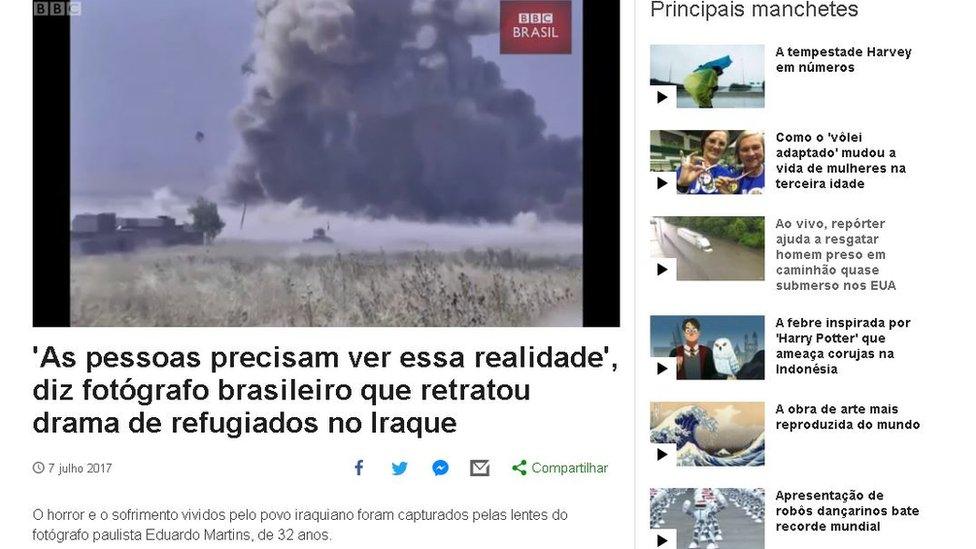
BBC Brasil deleted its interview with the fake UN photographer
Even though Eduardo Martins' scheme has now been busted, the identity of the individual behind the fake persona is still a mystery.
Fernando Costa Netto, a photographer and the owner of Sao Paulo-based DOC Galeria, says he may have inadvertently warned the fraudster that people were starting to get suspicious.
"I was putting together an exhibition showcasing the work of Brazilian photographers in war zones and had been in touch with him," Mr Costa Netto told BBC Brasil.
That was in late August.
"Then he disappeared for more than a week. I thought he had been kidnapped by IS or something. So I contacted some of his colleagues in Iraq. When we started looking for him, he re-appeared and said he'd just had a connection problem."
'Hey bro. I'm in Australia'
Presumably growing wary of the mounting suspicion and questions being asked, Eduardo Martins sent Mr Costa Netto a last message before closing his social media profiles and deleting his WhatsApp account.
"Hey bro. I'm in Australia. I made the decision of spending a year travelling around the world in a van. I will cut off everything, including the internet, and I deleted my IG [Instagram]," he wrote.
"I want to be [left] in peace. We'll speak again when I'm back. Hugs."